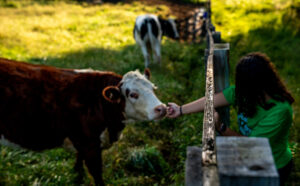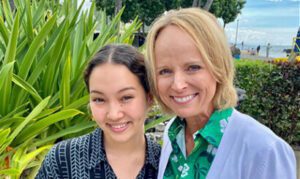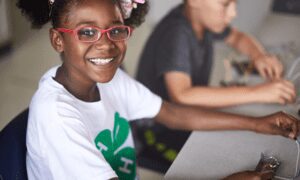I had a chance to speak with Michelle about women in STEM and how early experiences can build the framework for later success.
When did you first know STEM was the path for you? Is there a particular moment or experience that sparked your interest?
Michelle Munson (MM): There wasn’t a single moment. There were many, many moments, both at school and in 4‑H. My parents were focused—not just on learning, but also on the practical applications of learning. When I was as young as seven, my mom helped me make some very advanced clothing designs that I would sew from scratch. We also did computing projects—when I was in fourth grade, my mom and I developed a database to keep track of what I was doing in 4‑H.
I stayed in science and engineering because I loved math and science and saw that they had a major impact on the world. I also wanted to create new things. My dad is a farmer who grows crops and raises animals, and my mom is a professor. They both emphasized the value of applying my knowledge to create things, so I ended up choosing engineering because it’s the application. I started a software company where we make new products from the ground up—that’s what I do for my job.
Tell me about the challenges you face working in STEM.
MM: I think the number-one challenge of STEM is it’s hard. The joy comes from mastering difficult subject matter. The problems that we tackle at Aspera are hard. There are no clear answers. The counterpoint is the joy of succeeding when you’re able to advance your own knowledge and reach solutions to complex problems.
Did you face challenges as a woman in STEM?
MM: I think that any challenges were hugely mitigated for me because of my environment. I started doing STEM-related projects when I was young, and quite honestly there was no discussion of being a girl. It just didn’t enter the conversation. I think one of the great things about 4‑H is that it is very balanced in that way. Girls and boys do the same projects—they do them together—and moms and dads are equally involved.
How did the skills you learned in 4‑H influence your career?
MM: The most important skills I learned were public speaking and leadership. Every moment of every day, everything I do relies on being able to communicate effectively, both in speaking and writing. In 4‑H, we did so much public speaking, as well as a lot of writing, to record our projects. I also had leadership roles the entire time I was in 4‑H.
When did you decide entrepreneurship would be your path?
MM: I didn’t make a decision to start a company until I was about thirty. But I think 4‑H gave me many of the skills I needed, as well as the courage and the comfort level with independent projects. I’d been doing independent projects in 4‑H since I was seven, and building a company is very much like that. You use all of yourself—all skills and all aspects. You form something that no one has ever done before. You have to implement your own plan. It’s typically ridden with lots of challenges you have to overcome. It’s very similar to many 4‑H projects.
That’s the essence of leadership, learning to work with people in your own peer group to get things accomplished. And I believe 4‑H does that better than anything in the world.
How do we get more girls and minorities in STEM? What barriers are there?
MM: We have to get young people involved as early as possible. This is where 4‑H projects are so wonderful. You learn the subject in a practical way from a very young age, and it helps you develop an interest in it. 4‑H has no limits to the types of projects you can do in all aspects of science. They help young women develop a sense of independence and counter all of the tendencies that deter confidence in science and math.
How can we get young women more involved in leadership roles?
MM: The same way—4‑H does something very special: it asks young people to start leading their peers when they’re seven or eight years old. You’re responsible for sending out the e-mail or making the phone call to organize the meeting or project, then standing up at the meeting and presenting some information and playing a role in that meeting. To me, that’s the most formative thing. From an early age, you develop a sense of self and self-confidence, and it can build on itself as you get older into middle school and high school. That’s the essence of leadership, learning to work with people in your own peer group to get things accomplished. And I believe 4‑H does that better than anything in the world.
What advice would you give young girls or women starting in STEM?
MM: Stay in the field. Don’t stop. It’s too fantastic to deviate from. And enjoy it. What’s great about science is there’s no limit to what you can learn and there’s no limit to what you can do with it in your career. It’s the foundation of society now, and its practical impact is unlimited.
















